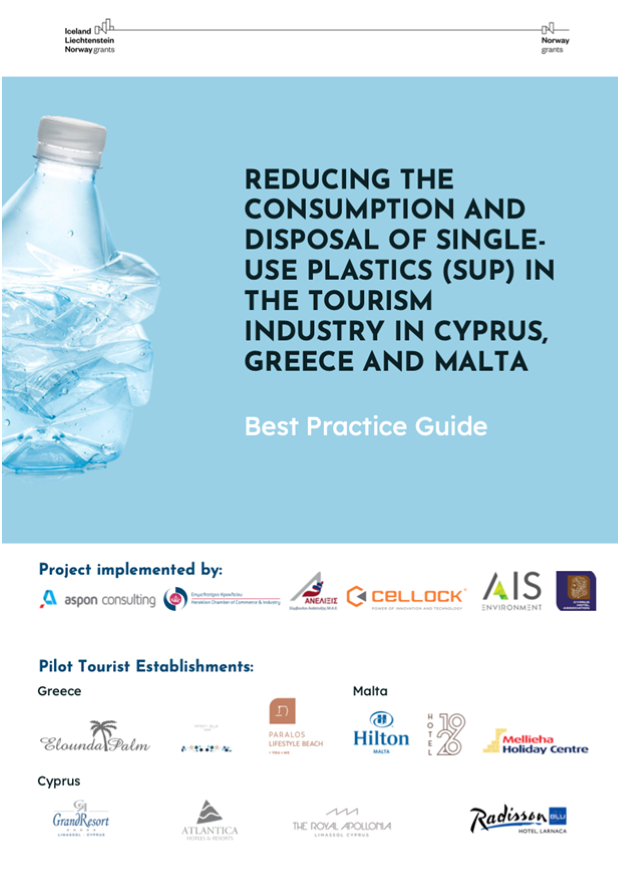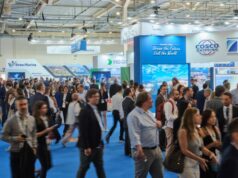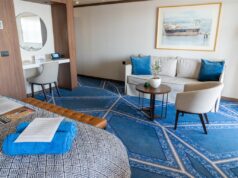Since July 2020, partners from Cyprus, Greece and Malta worked together as part of the project titled “Reducing the Consumption and Disposal of Single-use Plastics in the Tourism Industry in Cyprus, Greece and Malta”, also known as “SUPMed”. The Project provided innovative and sustainable solutions for tourist establishments to effortlessly reduce the consumption, disposal and impacts of Single Use Plastics (SUP) in the tourism sector in these three regions, in line with EU Directive 2019/904 (on the reduction of the impacts of plastic products). These solutions were tested by the ten tourist establishments in Cyprus, Greece and Malta through a pilot program. The results proved the effectiveness of the suggested recommendations and overall success of the project. The methodology, contribution of the pilot tourist establishments, impact of the SUP in the environment and human health and other relevant information is provided in the Best Practice Guide (available to download on line from https://www.supmed.eu/en/).
Tourist establishments across Europe can benefit from the project’s findings and deliverables to help them reduce SUP consumption and disposal, as well as guide them in a transition towards a more environmentally sustainable management style. It will help ensure that their operations are in line with the requirements outlined in the EU SUP Legislation.
The project had three main deliverables:
- Decision Support Tool (DST)
The DST provides a platform for businesses/entities to assess the environmental impact of their current SUP product selection compared with available product alternatives. The DST does not focus solely on the natural environment, but also provides a cost analysis of the switch to alternative SUP products.
- Bespoke Action Plans
Following on from the collection of baseline data provided by the hotel staff on the consumption of SUP items (including data from the DST), interviews with hotel guests and staff and in-house observations, a Bespoke Action Plan was drafted for each of the pilot hotels (a total of 10 plans). The Action Plans provide an overview of the SUPMed project, a summary of the results of the data collection in the hotels and a series of recommendations to help the individual hotels move away from SUP items to more environmentally friendly, yet cost effective alternatives.
- Best Practice Guide
The Best Practice Guide aims to provide an overview of the impacts of plastic on human and environmental health, present the results of the pilot studies, review the available SUP alternatives and their environmental impact based on the DST and replicate the recommendations made in the individual Action Plans. Finally, the report summarises the lessons learnt from the project and apply them to the tourism industry as a whole, and other relevant industries, to help the European Member States move away from SUP consumption.
To find out more about the project and the Best Practice Guide, check out the project website.
More about the project:
The SUPMed project runs until June 2023 with a total budget of €1,279,405.00. The six project partners participating in the project are Aspon Consulting Ltd as the Lead Partner (CY), Heraklion Chamber of Commerce and Industry (GR), Anelixis Development Consultants S.A. (GR), Cellock Ltd (CY), AIS Environment (MT) and the Cyprus Hotel Association (CY).
The project consortium aims to reduce the consumption, disposal and impacts of SUP in the tourism sector in these three regions, in line with EU Directive 2019/904 on the reduction of the impacts of plastic products. Through this project, the partners will support samples of coastal tourist establishments in Cyprus, Malta and Greece (Crete) via pilots to move to sustainable resource-efficient business models. The establishments will identify and replace commonly-used SUP with environmentally friendlier, readily available and affordable alternatives. The pilot samples will be supported in phasing out and replacing SUP via a bespoke free web-based decision-support tool (DST) that will be developed. The DST will present viable and available alternatives to the most commonly used SUP, taking into consideration the cost and environmental impacts of each alternative across its life-cycle.
Following the completion of the pilot in each of the three regions, a single best practice guide will be developed that will present the findings of the pilots, the impacts of plastic waste on human health and the environment, how to reduce SUP in the tourism and other sectors and what environmentally friendlier and affordable alternatives are available. These guides will be disseminated to SMEs, NGOs, tourist establishments and other relevant stakeholders in the three regions and across Europe, as an additional support tool in replacing SUPs.
The 10 tourist establishments of the pilot sample of the project per country are:
- Cyprus:
- GrandResort
- Atlantica Mare Village Ayia Napa
- Radisson Blue Hotel
- The Royal Apollonia
- Greece – Crete:
- Elounda Palm Hotel & Suites
- Infinity Blue Boutique Hotel & Spa
- Paralos Lifestyle Beach
- Malta:
- Hilton Malta
- 1926 Hotel & Spa
- Mellieha Holiday Centre
The project “Reducing the Consumption and Disposal of Single-use Plastics in the Tourism Industry in Cyprus, Greece and Malta” is funded by Iceland, Liechtenstein and Norway through the EEA and Norway Grants Fund for Regional Cooperation.












